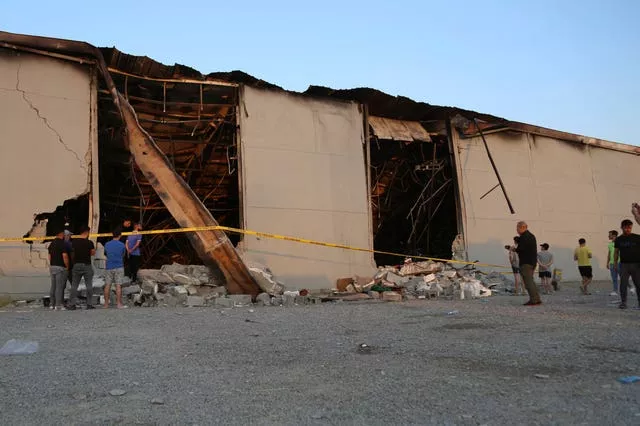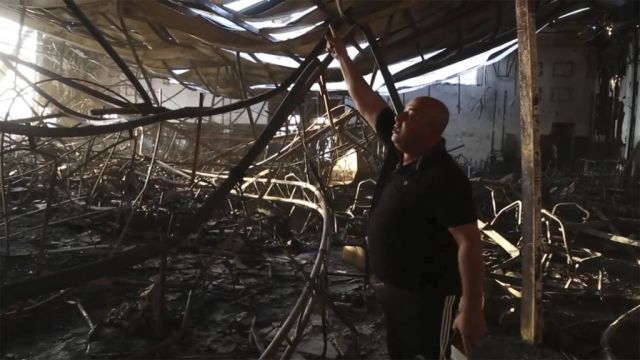A blaze believed to have been caused by fireworks set off to celebrate a Christian wedding has destroyed a hall packed with guests in northern Iraq, killing around 100 people and injuring 150 others.
Authorities said that flammable building materials also contributed to the latest disaster to hit Iraq’s dwindling Christian minority.
In the fire’s chaotic aftermath, officials offered conflicting death tolls and security officials said they detained staff at the wedding hall as part of their investigation.
The fire happened in the Hamdaniya area of Iraq’s Nineveh province. That is a predominantly Christian area just outside the city of Mosul, some 205 miles north west of Baghdad.
There was no official word on the cause of the blaze but the Kurdish television news channel Rudaw aired footage showing pyrotechnics shooting flames up from the floor and setting a chandelier on fire.
After the blaze, charred metal and debris could be seen as people walked through the hall.
Survivors arrived at local hospitals in bandages, receiving oxygen, as their families milled through hallways and outside as workers organised more oxygen cylinders. Some of those burned included children.
Ambulance sirens wailed for hours after the fire as paramedics brought out the injured.
Other footage shown on other local television networks appeared to show the bride and groom on the dance floor when the fire began on Tuesday night, stunned by the sight of the burning debris. It was not immediately clear if they were among those hurt.

“There were about to do a slow dance and then they lit up this thing for the dance which caught fire,” one injured woman told Rudaw from a hospital trolley.
Another man injured in the fire told Rudaw that the blaze started as the couple prepared for their slow dance.
“They lit up fireworks,” he said. “It hit the ceiling, which caught fire.”
“The entire hall was on fire in seconds.”
Extravagant wedding ceremonies are common in Iraq, like many countries in the Middle East.

Families often invite hundreds of relatives and members of the broader community, spending heavily on spectacular ceremonies with elaborately decorated halls, music and entertainers, often including pyrotechnics.
Casualty figures fluctuated in the hours after the incident. An initial Health Ministry statement, carried by the state-run Iraqi News Agency, said the blaze killed over 100 people and injured 150. Health officials in Nineveh province put the death toll at 114.
A Health Ministry official, speaking to The Associated Press on Wednesday, put the death toll at 92, with 101 people still receiving medical treatment.
“The death toll is expected to rise as some are in critical condition,” he said.
Prime Minister Mohammed Shia al-Sudani ordered an investigation into the fire and asked the country’s Interior and Health officials to provide relief, his office said.
Hamdaniya is on Iraq’s Nineveh Plains and under the control of its central government, though it is close to and claimed by Iraq’s semi-autonomous Kurdish regional government.

Masrour Barzani, the prime minister of the Kurdish region, ordered hospitals there to help those hurt in the blaze.
The different governments being involved in the response to the fire added to the uncertainty over the blaze’s toll.
The United Nations’ mission to Iraq offered its condolences over the blaze as well, describing its staff as “shocked and hurt by the huge loss of life and injuries” in the blaze.
Father Rudi Saffar Khoury, a priest at the wedding, said it was unclear who was to blame for the fire.
“It could be a mistake by the event organisers or venue hosts, or maybe a technical error,” Mr Khoury told the AP. “It was a disaster in every sense of the word.”
Interior Ministry spokesman Saad Maan, in a video from the wedding venue, said that the primary forensic report described a “lack of safety and security measures” at the venue.
Iraqi security forces arrested nine workers at the venue as part of their investigation, said Abdullah Al-Jabouri, a security official who heads the Nineveh Operations Command.
Civil defence officials quoted by the Iraqi News Agency described the wedding hall’s exterior as decorated with a highly flammable type of “sandwich panel” cladding that is illegal in the country.
“The fire led to the collapse of parts of the hall as a result of the use of highly flammable, low-cost building materials that collapse within minutes when the fire breaks out,” a spokesman said.
One of the owners of the venue, Chonny Suleiman Naboo, blamed the fire on an “electrical fault in the ceiling”. He insisted the venue had “all the officials’ approvals” and that his brother and the hall’s supervisor would turn themselves in to authorities.
“We were attacked by residents and our cars were damaged because of what happened, and we’re worried that our homes could be attacked too,” Mr Naboo said.







